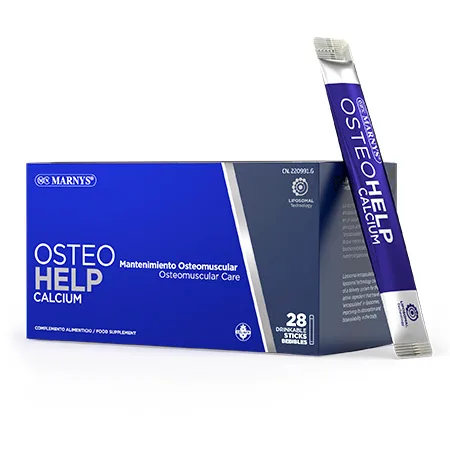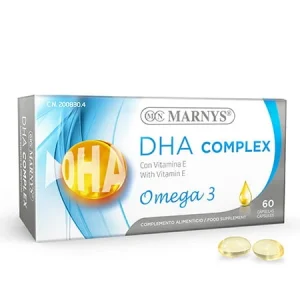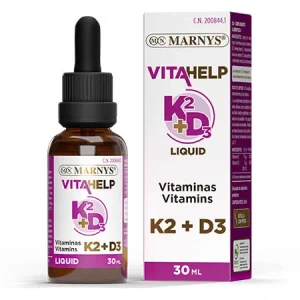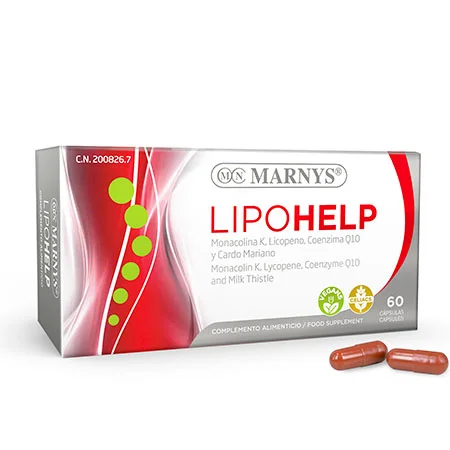? Ask us your questions
Share on social networks
FREQUENTLY ASKED QUESTIONS ABOUT DIGESHELP
TO LEARN MORE
Bone mass, metabolism and aging
Bone and muscle health is fundamental to overall well-being and quality of life, especially as we age. Adequate bone mass and proper muscle function are essential for maintaining musculoskeletal health.
Once peak bone mass is reached, usually in late adolescence or early twenties, maintaining bone density is crucial. Throughout adulthood, the balance between bone resorption (breakdown) and bone formation is essential for preserving skeletal integrity. Disruptions to this balance, especially excessive bone resorption, are associated with bone fragility.
Bone metabolism undergoes significant changes with age and hormonal changes during this period; in particular, in women, a decrease in estrogen levels during menopause affects bone integrity.
Therefore, maintaining musculoskeletal health through proper nutrition and supplementation becomes increasingly important as people age.
Key nutrients for musculoskeletal health
What you eat plays a huge role. A varied and nutrient-rich diet is essential. Pay special attention to these three friends of your bones and muscles:
- Calcium: It is the main mineral in bones and an essential component for muscle contraction. Adequate calcium intake throughout life is essential for building and maintaining strong bone mass and proper muscle function.
- Where to find it? Dairy products (milk, yogurt, cheese), dark green leafy vegetables (broccoli, spinach), legumes, nuts (almonds), tofu, and small fish with bones (sardines).
- Magnesium: This mineral is a great ally of calcium, as it regulates its activity by balancing the processes of bone metabolism and muscle contraction-relaxation.
- Where to find it? Whole grains, nuts (almonds, cashews), seeds (pumpkin, sunflower), legumes, avocado, banana, dark chocolate and leafy green vegetables.
- Vitamin D: This vitamin is key! Without vitamin D, your body can't absorb calcium from food, no matter how delicious your meal is. It's like the "transporter" that carries calcium to your bones.
- Where can you find it? Primarily through sun exposure . About 15-20 minutes a day on your arms and face (without sunscreen, at safe times) is usually enough. It's also found in foods like fatty fish (salmon, mackerel, sardines), egg yolks, and some fortified foods (milk, cereals). In some cases, a supplement may be advisable under medical supervision, especially if you live in areas with little sun exposure or have a deficiency.
Keys to musculoskeletal well-being
Taking care of your bones and muscles is based on three essential pillars: regular physical exercise, a balanced diet, and the prevention of harmful habits.
- Regular Physical Activity: You don't have to be an elite athlete, but moving your body consistently is crucial.
- Strength training: Incorporate activities that work your muscles against resistance (such as lifting weights, using resistance bands, or doing bodyweight exercises). This strengthens the muscles surrounding your bones, providing stability and protection.
- Impact exercises: Activities such as brisk walking, running, jumping, or dancing are excellent for your bones, as the impact stimulates the formation of bone tissue.
- Flexibility and balance: Stretching and activities like yoga or Pilates improve your range of motion and prevent falls.
- Healthy Habits:
- Avoid tobacco and excessive alcohol consumption: Both can weaken your bones and increase the risk of fragility.
- Maintain a healthy weight: Excess weight can overload your joints.
- Correct posture: Pay attention to your posture when sitting, studying, or carrying weight, especially your backpack. Good posture prevents pain and injuries!
- Adequate rest: Your muscles need time to recover and repair.
- Stress management: Chronic stress can affect bone and muscle health.
Taking care of your musculoskeletal system is an investment in your future. By combining exercise, a diet rich in calcium, magnesium, and vitamin D, and healthy lifestyle habits , you'll be laying the foundation for a life full of movement, energy, and well-being. Your bones and muscles will thank you!
Refrances
- Holick MF & Chen TC . Vitamin D deficiency: a worldwide problem with health consequences. Am J Clin Nutr. 2008 Apr;87(4):1080S-6S.
- Magnesium: Fact Sheet for Health Professionals. [Internet]. Bethesda: NIH; [Updated June 2022; accessed June 2025]. Available from https://ods.od.nih.gov/factsheets/Magnesium-HealthProfessional/
- Risk Factors. [Internet]. Nyon: International Osteoporosis Foundation; [Consulted Jun 2025]. Available at https://www.osteoporosis.foundation/patients/about-osteoporosis/risk-factors
- Staying healthy. [Internet]. Rosemont: OrtoInfo: American Academy of Orthopedic Surgeons; [Consulted Jun 2025]. Available at https://orthoinfo.aaos.org/en/staying-healthy/
- Vitamin D: Fact Sheet for Health Professionals. [Internet]. Bethesda: NIH; [Updated Jul 2024; consulted Jun 2025]. Available at https://ods.od.nih.gov/factsheets/VitaminD-HealthProfessional/































Reviews
There are no reviews yet.